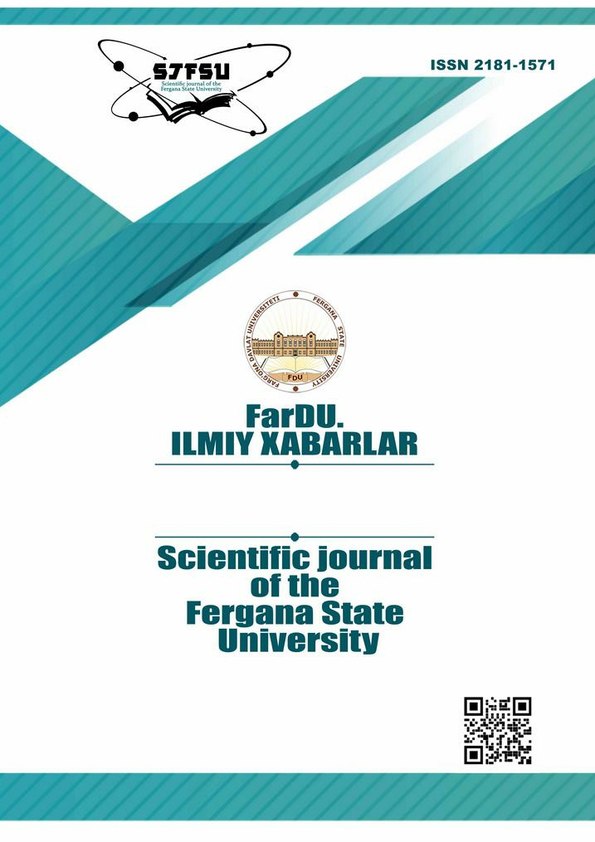DEVELOPMENT OF LEXICAL COMPETENCE OF UNIVERSITY STUDENTS USING VOCABULARY LEARNING STRATEGIES
Keywords:
Lexical competence, vocabulary learning strategy, lexical knowledge, vocabulary, memory, metacognitive, cognitive, social, determination strategies.Abstract
This study aimed to investigate the use of vocabulary learning strategies (VLS) and their effects on the development of students' lexical knowledge, to identify the most and least used vocabulary learning strategies by the participants, and to improve students' lexical competence. In order to find answers to the above questions, a questionnaire was taken from one hundred second year undergraduate students of Fergana State University. Participants answered the VLS questionnaire adapted from Schmitt's (1997) taxonomy of vocabulary learning strategies. The results of the experiment showed that students preferred to use memory and metacognitive strategies in learning new words. The results of the study showed that the use of VLS has a positive effect on the development of lexical competence. Based on the results of the research, teachers and students were given appropriate suggestions to open the way to improve lexical knowledge.
References
Brawn, H. D. (1987). Til o‘rganish va o‘qitish tamoyillari. Nyu-Jersi: Prantice Hall regentlari (Brown, H. D. (1987). Principles of language learning and teaching. New Jersey: Prentice Hall Regents)
Catalan, R. M. J. (2003). Ikkinchini til lug‘atni o‘rganish strategiyalarida jinsiy farqlar. Xalqaro amaliy tilshunoslik jurnali, 13(1), 54-77. (Catalán, R. M. J. (2003). Sex differences in L2 vocabulary learning strategies. International Journal of Applied Linguistics, 13(1), 54-77.)
Cohen, A. D. (1987). Ikkinchi til lug‘atida og‘zaki va tasvirli mnemonikadan foydalanishni o‘rganish. Ikkinchi tilni o‘zlashtirish bo‘yicha tadqiqotlar, 9, 43-62. (Cohen, A. D. (1987). The use of verbal and imagery mnemonics in second language vocabulary learning. Studies in Second Language Acquisition, 9, 43-62.)
Emrah, E. va Ismoil, Y. (2014). Onlayn orqali talabalarning leksik kompetensiyasini rivojlantirish mashq qilish. Xalqaro ijtimoiy tadqiqotlar jurnali, 7(31) (Emrah, E., & Ismail, Y. (2014). Developing students’ lexical competence through online exercise. The Journal of International Social Research, 7(31))
Gulnoraxon Mo‘minova. (2022). Koreys tilining lug‘at o‘rganish strategiyalari bo‘yicha tadqiqot va o‘zbek tilini o‘rganuvchilar. Frontline ijtimoiy fanlar va tarix jurnali, 2(02), 39–46. (Gulnorakhon Muminova. (2022). An investigation into vocabulary learning strategies of Korean and Uzbek learners of English. Frontline Social Sciences and History Journal, 2(02), 39–46.)
Qaxarova, M. (2021). O‘ZBEK TILINI ME'NAT ETGAN LEKSEMALARNING MIKRO MAYDON XALQ BAYRAMLARI VA MEHNAT MAROSIMLARI. NAZARIY VA AMALIY SCIENCE Hujjatlari: Nazariy va amaliy fanlar,(9), 646-648. (Kaharova, M. (2021). MICRO FIELD OF LEXEMES WHICH DENOTE UZBEK PEOPLES’HOLIDAYS AND WORK CEREMONIES. THEORETICAL & APPLIED SCIENCE Founders: Theoretical and Applied Science,(9), 646-648.)
Qaxarova, M. va Yusupova, D. (2022). Dars rejasiga yangi yondashuvlar. Yevropa jurnali Gumanitar fanlar va ta'lim yutuqlari, 3(1), 40-42. (Kakharova, M., & Yusupova, D. (2022). New Approaches To Lesson Plan. European Journal of Humanities and Educational Advancements, 3(1), 40-42.)
Qaxarova, M. M. (2020). Matn ustida ishlash. Academika: xalqaro multidisipliner tadqiqot jurnali, 10(12), 489-491. (Kaxarova, M. M. (2020). Working on text. Academicia: an international multidisciplinary research journal, 10(12), 489-491.)
Moʻminova, G. (2022, fevral). Lug‘atni o‘rganish strategiyasidan foydalanishga ta'sir qiluvchi omillar. Ta'lim va ijtimoiy fanlar bo‘yicha xalqaro konferentsiya jurnali, 2(2). (Mo‘minova, G. (2022, February). Factors affecting vocabulary learning strategy use. International journal of conference series on education and social sciences, 2(2).)
Moʻminova, G. (2022). CHET TILNI O‘QITISH VA O‘RGANISHDA LEKSIK KOMPETENSIYANI RIVOJLANTIRISHNING AHAMIYATI. 21-ASRDA INNOVATSION TA'LIMNING O‘RNI VA AHAMIYATIGA BASHLANGAN XALQARO KONFERENSIYA, 1(2), 19-22. (Muminova, G. (2022). THE IMPORTANCE OF DEVELOPING LEXICAL COMPETENCE IN TEACHING AND LEARNING A FOREIGN LANGUAGE. INTERNATIONAL CONFERENCE DEDICATED TO THE ROLE AND IMPORTANCE OF INNOVATIVE EDUCATION IN THE 21ST CENTURY, 1(2), 19–22.)
Nation, P. (1995). Lug‘atni o‘rgatish va o‘rganish bo‘yicha eng yaxshi tajribalar. EA Journal, 13(2), 15. (Nation, P. (1995). Best practices in vocabulary teaching and learning. EA Journal, 13(2), 15.)
Schmitt, N. va Meara, P. (1997). So‘zdan iborat bilim doirasi orqali lug‘atni o‘rganish: so‘z birikmasi va og‘zaki qo‘shimcha. Ikkinchi tilni o‘zlashtirish bo‘yicha tadqiqotlar 19, 17-36 (Schmitt, N., & Meara, P. (1997). Researching vocabulary through a word knowledge framework: word association and verbal suffix. Studies in Second Language Acquisition 19, 17-36)
Zilola, P. (2022). Barqaror birliklarni amalga oshirish. Amerika ijtimoiy va gumanitar tadqiqotlar jurnali, 3(10), 117-121. (Zilola, P. (2022). Realization of Stable Units. American Journal of Social and Humanitarian Research, 3(10), 117-121.)
Pazilova, Z. Sh. (2022). O‘ZBEK VA NEMAN XALQLARIDA BOLALIK DAVRANI LEKSIK FOTOLARINING XUSUSIY XUSUSIYATLARI. OLIY VA O‘RTA MAXSUS TA’LIM VAZIRLIGI FARG‘ONA DAVLAT UNIVERSITETI, 122. (Пазилова, З. Ш. (2022). SPECIFIC CHARACTERISTICS OF LEXICAL EXPRESSIONS OF CHILDHOOD PERIOD IN UZBEK AND GERMAN PEOPLE. MINISTRY OF HIGHER AND SECONDARY SPECIAL EDUCATION FARG‘ONA STATE UNIVERSITY, 122.)
Downloads
Published
Issue
Section
License
Copyright (c) 2023 Scientific journal of the Fergana State University

This work is licensed under a Creative Commons Attribution-NonCommercial-NoDerivatives 4.0 International License.
How to Cite
Most read articles by the same author(s)
- , , , DETERMINATION OF AMINO ACIDS IN ERIOBOTRYA JAPONICA SEED BY HPLC , Scientific journal of the Fergana State University: No. 4 (2024): FarDU.Ilmiy xabarlar jurnali (Aniq va tabiiy fanlar)
- , PEDAGOGICAL NEED OF DEVELOPING HYGIENE COMPETENCE IN STUDENTS OF MEDICAL EDUCATIONAL INSTITUTIONS , Scientific journal of the Fergana State University: No. 4 (2024): FarDU.Ilmiy xabarlar jurnali (Aniq va tabiiy fanlar)
- , , MORPHOLOGY AND BIOECOLOGY OF SITONA CYLINDRICOLLIS (FAHRAEUS, 1840) AMONG THE REPRESENTATIVES OF THE FABACEAE FAMILY , Scientific journal of the Fergana State University: No. 1 (2025): FarDU ilmiy xabarlari jurnali (TABIIY FANLAR)
- Anvarjon qizi, Mamajonovna, BIOLOGY OF DEVELOPMENT OF REPRESENTATIVES OF THE GENUS LIXUS DISTRIBUTED IN THE FERGANA VALLEY , Scientific journal of the Fergana State University: No. 3 (2025): FarDU ilmiy xabarlari jurnali (Tabiiy fanlar)
- Saminov Xusniddin Numonjon o‘g‘li, Nazarov Otabek Mamadaliyevich, Axmadjonova Gulnoraxon Dilmurodjon qizi, Mirabilis jalapa L. O‘SIMLIGINING AMINOKISLOTA VA FENOL BIRIKMALARI TARKIBINI O‘RGANISH , Scientific journal of the Fergana State University: No. 6 (2025): FarDU. Ilmiy xabarlar jurnali (Tabiiy fanlar)

